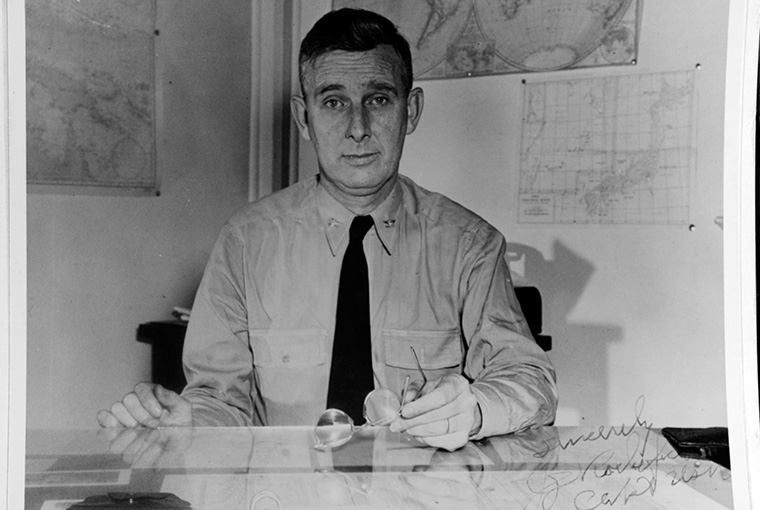With a Nod to WWII Codebreaking Hero, Rochefort Group Tackles New Age of Warfare

The Rochefort Group was formed at U.S. Naval War College in August 2018 after associate professor Erin Meehan and Cmdr. Matthew Griffin, both career cryptologic warfare officers, surveyed the information-warfare landscape and concluded that a new effort was needed.
“Critical mass over our careers has shifted so deliberately to information warfighting,” Meehan said.
“Technological advances in warfare, and certainly the great-power competition, have caused us to relook at the threats that are out there,” said Griffin. “Information warfare is at the core of all that.”
News headlines are full of hacking attacks by foreign governments, but the Rochefort group is focused on information threats at the level of armed conflict – in other words, the localized digital environment that U.S. ships, aircraft and troops face every day when dealing with adversarial nations and factions.
“We need to become as comfortable in the electromagnetic spectrum as we are on the sea,” said Michael White, dean of the College of Maritime Operational Warfare, which includes the new group. “The Rochefort Group is helping us understand and develop that skill.”
The group consists of six Naval War College faculty members with expertise from cybersecurity to submarines, aided by 29 adjunct members. It's a mix of practical and academic knowledge.
They held their first workshop in March, bringing together senior representatives from the information warfare staffs of every Navy fleet. Retired Pacific Fleet Commander Scott Swift moderated the discussion.
“Talking about the challenges that they face at their fleet with their counterparts and colleagues was a big win,” Griffin said.
The Navy’s Information Warfare community is still fairly young. It was created in 2009 by the merger of four areas of Navy expertise: cryptology, the Navy’s traditional codebreakers; meteorology and oceanography, the people who monitor the weather and the seas; intelligence, the people who analyze information; and information professionals, the administrators of computer networks.
These subject-matter experts are still figuring out how to integrate their skills, and events like the one in March are intended to help, said Meehan and Griffin. Rochefort members plan to hold two workshops a year, with the next in August.
At the Naval War College, Meehan and Griffin said they saw a niche where they can help address the gap that has opened between traditional warfare and the digital battlefields of today: education and support of the fleet.
“We educate people from senior enlisted to flag officers, going out to fleet commander staffs,” Meehan said.
For example, a commander might contact them with a problem along these lines: How do I help my staff members -- who are highly trained at flying aircraft or fighting ships – integrate the new field of information warfare operations into their expertise?
The group would make an assessment. Do they put together a team of experts and send them to the commander’s staff for a week-long workshop on that topic? That’s a very likely answer, Meehan and Griffin said.
The broader response to that kind of query has been a series of fleet-oriented classes offered throughout the year on campus, focused on incorporating information warfare into the fight.
“We’re allowed that kind of freedom of thought with a very scientifically heavy subject,” Meehan said. “Being able to do that in an academic environment, I think, is not duplicated anywhere in the fleet.”
Rochefort is not a research group, Griffin said. It doesn’t have students assigned to it, and its members don’t conduct much academic-style research.
The college coined a new term for it: advanced warfighting group.
Its namesake is Capt. Joe Rochefort, the WWII cryptological officer whose codebreaking is credited with helping win the Battle of Midway in June 1942. He was posthumously awarded the Presidential Medal of Freedom in 1986 for his role.
Rochefort’s example from WWII still rings true today, Meehan and Griffin said.
“At that time, the naval force was enamored with battleships, carriers and traditional, conventional warfighting. You had this guy, Rochefort, with a small group of people going after energy and the radio frequency spectrum,” Griffin said.
“It was kind of a sideline effort, and it proved critical. That’s how our community relates to him.”
In five years, the Rochefort members want to be known as a center of excellence -- for both the Navy at large and individual information-warfare officers. They’d also like to see the group’s core membership grow, with more faculty members assigned to Rochefort as a full-time project.
“We’d like to institutionalize being a kind of ‘belly button’ for the faculty, the students and the fleet commanders’ staffs,” Meehan said. “Having something clearly defined for this warfare area is important to us.”
